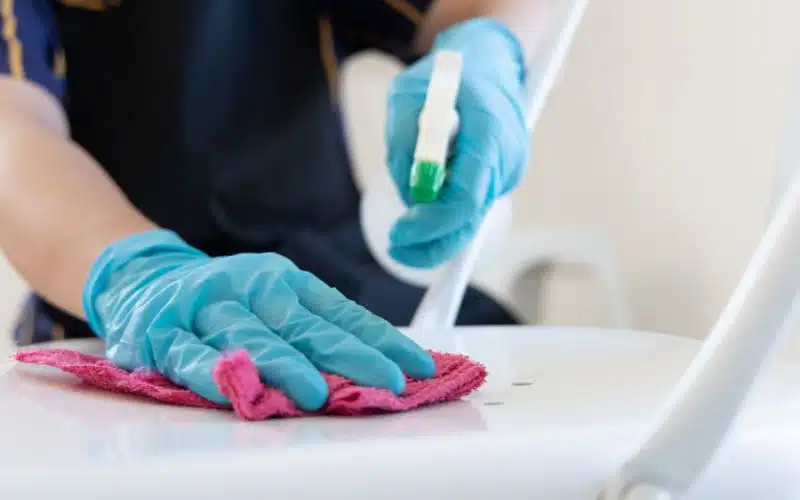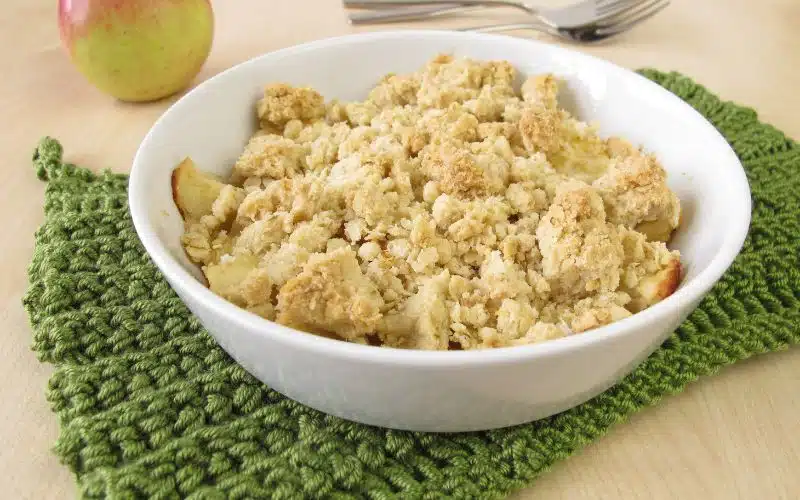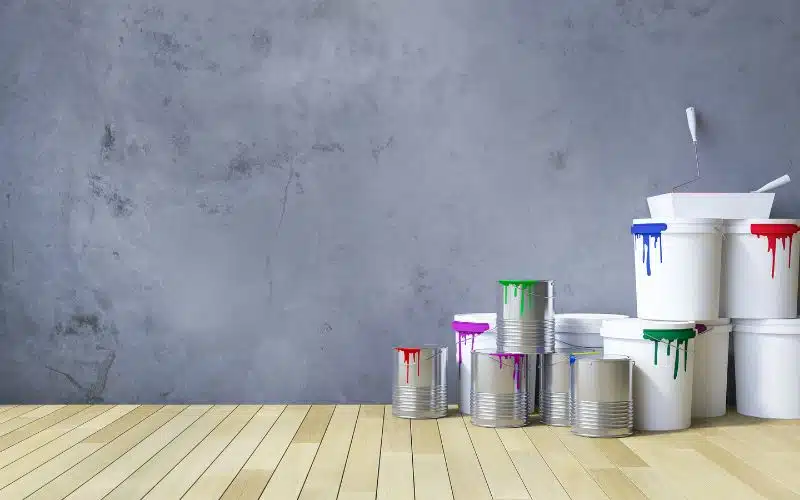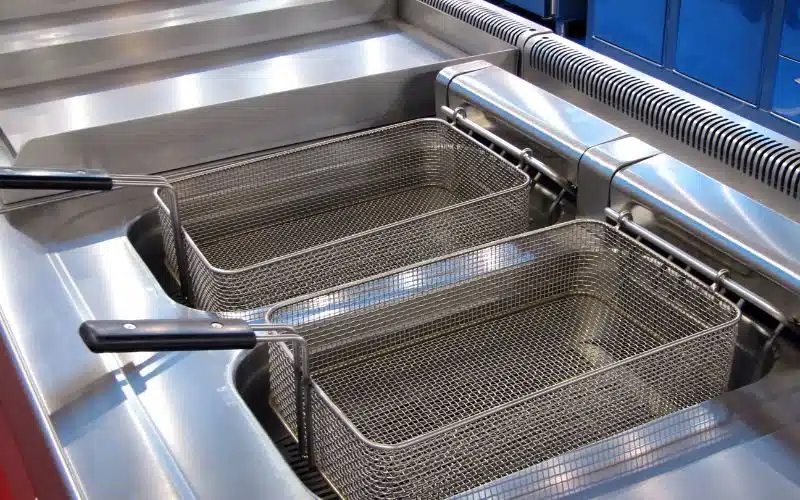Have you ever thought soap Residue on dishes could make you sick? That’s right, the invisible soap residue left after washing might be harmful.
We’re diving into why this happens and how you can stop it. Let’s keep our meals safe and soap-free!
Key Takeaways
- Ingesting soap residue over time can cause health issues.
- Thorough rinsing of dishes is important to avoid soap ingestion.
- Understanding the components of soap can aid in choosing safer dishwashing products.
Is Soap Residue On Dishes Harmful?
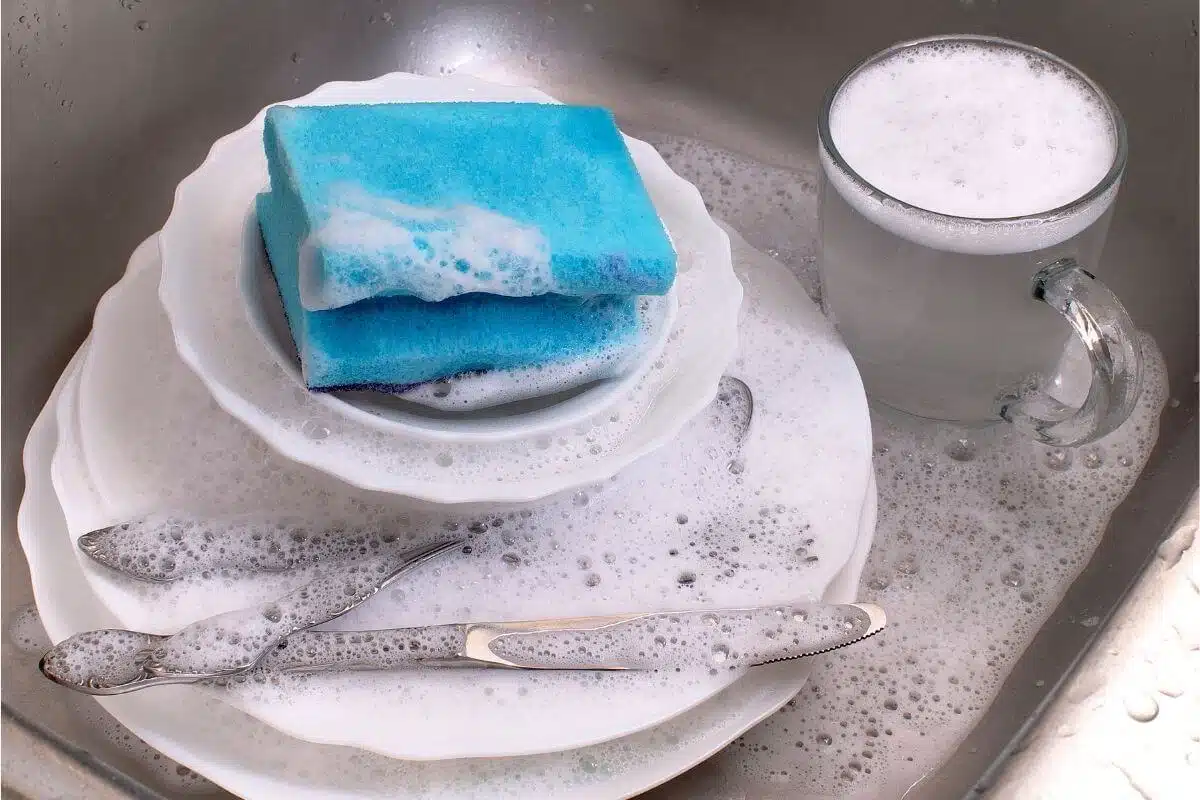
1. Washing Dishes Manually
When you wash dishes by hand, it’s essential to be thorough to reduce the presence of harmful soap residue.
Proper washing and rinsing should remove most of the detergent used to break down grease and food residue.
- Scrubbing: You should scrub plates, glasses, and cookware to remove food particles.
- Rinsing: Ensure hot water is used to rinse off the lather, leaving your utensils clean.
Direct handling during the wash process allows you to feel the surface of the dishes; if they are slippery, more rinsing is needed. This practice helps to minimize the risk associated with detergent residue.
2. Using A Dishwasher
Dishwashers clean dishes in bulk, sometimes leading to more soap residue on your dishware.
Here’s what you should consider:
- Surfactant Residue: Chemical surfactants from dishwashing detergents may not be fully rinsed away, mixing with your next meal.
- Fungi Presence:
| Dishwashers | Effect on Health |
|---|---|
| Fungi Buildup | Can cause more harm, spreading with soap residue |
Regularly maintain your dishwasher to prevent mold and use recommended amounts of detergent to decrease soap film on dishes.
Remember, while occasional exposure to small amounts of soap residue might not pose significant health issues, you should avoid regular ingestion to prevent potential harm to your health.
Do You Have To Rinse Soap Off Dishes?
Rinsing soap off your dishes is essential. When you wash dishes with soap, you’re not killing the germs; you’re loosening them so they can be washed away with water.
If you skip this step, you leave potentially harmful microbes and soap residue on dishes.
Here’s why you must rinse:
- Soap traps germs and dirt but does not eliminate them.
- Only rinsing with water can remove these trapped particles.
Failing to rinse dishes properly can lead to:
- Health hazards: Ingesting soap residue can cause discomfort or health issues.
- Sanitation problems: Remaining microbes can contaminate your food.
Consider using rinse aids as they:
- Help remove leftover soap and microbes more effectively.
- Work with your dishwasher to sanitize dishes post-wash.
Follow these guidelines to ensure dishes are safe for use:
| Step | Purpose |
|---|---|
| Wash | Apply soap to loosen stains, grime, and microbes. |
| Rinse | Remove any traces of soap and suspended contaminants. |
| Dry | Allow air-drying or use a clean towel for immediate use. |
Remember, thorough rinsing is as important as the washing itself to ensure hygiene and safety in your kitchen.
What Happens If Dish Soap Gets In Food?
1. Mild Symptoms
If you ingest food with small traces of dish soap, expect some discomfort.
Here’s what you may experience:
- Swelling: Your tongue and lips might swell.
- Stomach Issue: You could feel stomach cramps and mild nausea.
- Vomiting: There is a possibility of vomiting.
- Throat Irritation: Perfumes in dish soap can damage throat tissue over time, potentially leading to pain and irritations.
- Cardiovascular Alterations: Ingesting dish soap might cause low blood pressure and, uncommonly, altered heart rate.
2. Extreme Symptoms
Greater quantities of dish soap in your food can lead to severe health problems.
Below are some serious consequences:
- Severe Throat and Stomach Damage: This can cause permanent burns in the throat and stomach lining.
- Vomiting Blood: Excessive and potentially dangerous vomiting may occur, which could contain blood.
- Necrosis: Repeated exposure to soap in food can lead to skin cell death.
Should you experience any of these severe symptoms, seek immediate medical help, as these conditions are potentially life-threatening.
These extreme cases occur more frequently when food with soap residue is served in larger settings, such as food businesses.
Does Dish Soap Give You Diarrhea?
Dish soap ingestion often leads to diarrhea because it irritates your digestive tract.
When soap residues reach the intestines, they trigger rapid bowel movements, typically resulting in loose stools. In extreme instances, such irritation can cause bloody stools.
Eating dish soap residue poses a challenge for digestion, causing diarrhea as your body struggles to process this foreign substance.
Medical professionals may use soap suds as a laxative during severe constipation, reflecting its potent effect on the bowels.
| Symptoms of Soap Ingestion | Recommended Dietary Actions |
|---|---|
| Diarrhea | Consume starch-rich foods like rice and toast |
| Intestinal irritation | Add bananas to your diet for their binding properties |
Immediate medical attention becomes critical if you face persistent diarrhea. On the less severe end, adjusting your diet to include starchy foods with low fiber content aids in stool formation and supports the healing of your digestive tract.
